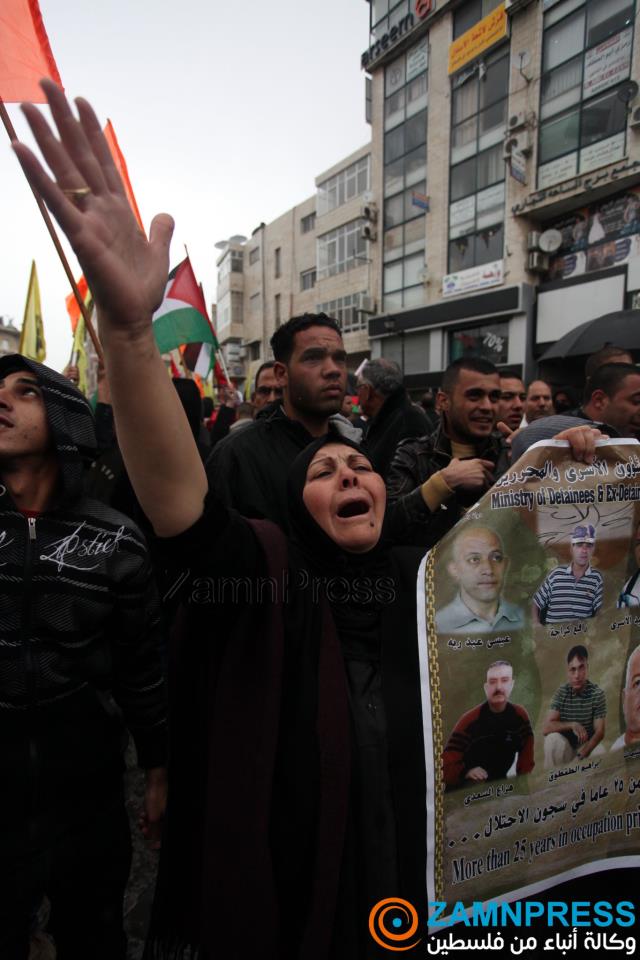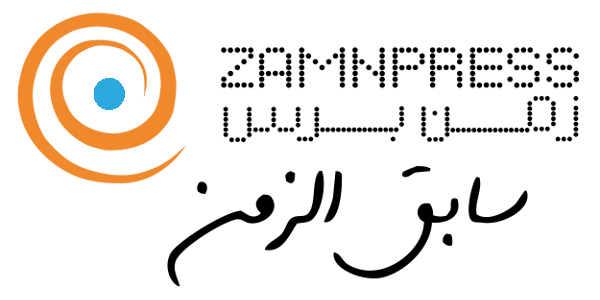Palestinian prisoners’ in Israeli occupation prisons as of 15 April 2013

Palestinian Prisoners’ Club Published a comprehensive documentary report on the status of the Palestinian prisoners in Israeli jails.
:Zamn Press shares the Report as received
Ramallah, Palestine
April 15, 2013
Palestinian prisoners’ in Israeli occupation prisons as of 15 April 2013.
Palestinian prisoners' nationalism is intimately associated with the long struggle of the Palestinians with the Zionist movement and subsequently the State of Israel that was created on the historical land of Palestine and resulted in displacement of one third of the Palestinian people on the hands of Zionist militias and their collaborators racial cleansing followed by the State of Israel occupation of the remaining Land of Palestine in 1967 which continues to present day.
Despite the many tragedies endured by the Palestinian people, unjust imprisonment was and still is a major contributor in the Palestinian revolution and resistance to the occupation and their allies that conspired against Palestine and its original people- the Palestinians.
The plight of the Palestinian prisoners can be considered one of the most arduous humanitarian, political and legal cases of modern times considering its large scale ; More than 800,000 detention and imprisonment since the time Palestine was occupied in 1948.
The darkest hours for the Palestinians occurred during the first uprising in 1987 followed by the 2000 uprising in which thousands of Palestinians were unjustly imprisoned. Imprisonment has major influence on the Palestinian revolution and its aspiration to free the land from its occupiers. Such a large scale revolutionary component has hit the entire Palestinian society in which many households had at least one of its members either male or female or even child that was detained or imprisoned. The Prisoners represent the Palestinian people and their aspirations for life and future free of misery and obstruction. The occupying State of Israel and its governments has sanctioned all approaches to imprison Palestinians without regard to gender or age or even the ill and disabled. They are determined to break the will power of the Palestinian people and its legendary resistance.
Current classification of prisoners confined in the Israeli prisons.
As of 2013 there were close to 5,000 Palestinian prisoner spread over 27 prison, jail, detention center and interrogation camps.
1. Veteran Prisoners
Are those prisoners who were imprisoned before the signing of the Oslo accords between Israel and PLO , currently at 106 with their latest prisoner detained more than 20 years ago and 50 of them have been detained more than 25 years including Karim Younis, the longest serving prisoner having spent 31 years in Israeli prisons.. Those prisoners are not receiving any leniency considering their age , long years in prison frailty or deteriorating health condition resulting from years of confinement.
2. Female Prisoners
Palestinian Women were always involved as much as their male counterparts in their resistance to the occupation, becoming martyrs, injured and prisoners. Over the years of Palestinian resistance, there has been close to 16,000 women prisoners both adult and child as Israel does not distinguished between child and adult. During the first uprising "intifada" close to 3,000 females were imprisoned and another 1000 female imprisoned during the second uprising. Currently there are 14 woman prisoner with Lina Jarbouni being the longest serving prisoner , 11 years out of her 20 years sentence. There are documented cases of pregnant female prisoners in which they had to give birth in prison in pathetic sanitary and medical conditions without any family support during their labor. Newborns did not receive any better treatment than their mothers as they were kept in the same harsh prison conditions and were denied basic needs by all humanitarian and moral codes including delayed dispensing of baby formula, milk and food appropriate to their age and developmental status. Families are not allowed to deliver toys, clothing, formula and diapers to the babies and toddlers.
3. Children Prisoners
The detention and imprisonment of children has been used by the Israeli forces before and after the Oslo Accords. During the first uprising hundreds of boys and girls were detained in which they endured bodily abuse and torture in blatant disregard to international accords concerning children. During the second intifada, close to 10,000 child ages 12 to 18 were imprisoned, some of whom are still imprisoned, coming of ages while in prison. Children are humiliated and abused starting from the moment they are detained which usually occur in the late hours of the night through the their confinement. Many children’s' confessions were obtained under duress or torture and many were sentenced in abstain. In addition to high and unaffordable fines, children prisoners suffer all sorts of psychological illnesses as a result of the torture and abuse they endure including depression, anxiety, social withdrawal, insomnia and school behavioral problems. Currently there are 235 child prisoner in Israeli prisons.
4. Administrative Prisoners.
Administrative imprisonment is the prisoner’s worst enemy in which a person is detained indefinitely without the opportunity for legal consul or court day for what the Israeli call the “secret file” that is compiled by Israeli Intelligence. It can range anywhere from a month to 6 months, renewable indefinitely by orders of military commanders using the “Secret File” excuse. As with other prisoners , there is no separation between child or adult, male or female, healthy , ill or disabled. Among the currently held 200 administrative prisoners are 14 Parliamentary members.
5. Martyr Prisoners
These are the prisoners who died during their detention either by execution or intentional medical negligence. The latest fatality of medical negligence was that of Maysara Abou Hamdeyeh who died as a result of cancer that was ignored by the Bureau of prisons. Since the establishment of the occupying State of Israeli it have conducted mass executions in cold blood against Palestinian prisoners , many times shortly after detention calming attempted escapes by the detainee other times by claiming prisoner suicide in an attempt to conceal their crime and escape legal consequences. Many times, the Israeli military let wounded prisoners bleed to death refusing to render needed medical assistance. In many occasions and despite prior knowledge by Israeli of armless Palestinians, yet, orders are issued to execute them. Total number of martyred prisoners 207
6. Sick prisoners
There is no official number of the current number of sick prisoners confined in Israeli prisons but it is estimated around 700 sick prisoner, 20 of whom are permanently confined in the Ramla Prison Clinic. The case of sick and injured prisoners is one of the top pressing issues regarding prisoners in the medical negligence to their health conditions. Many sick prisoners were detained while injured or wounded by Israeli military and at times kidnapping wounded people from ambulances and hospitals. Many of the ill and wounded prisoners require urgent surgeries and intense medical management by specialist as many of them suffer from heart conditions, , lung , kidney and vertebral problems. Some of prisoners are paralyzed , amputees or dismembered with intolerable pain that is only addressed by pain killers and sedatives. Bureau of Prisons purposefully delays the transport of sick prisoners from prisons to hospitals.
7. Solitary confinement prisoners
Some Israeli prisons are filled with Palestinian prisoners in solitary confinement .Confinement in dark and miniscule cells for extended periods in total isolation of the other prisoners . Solitary isolated prisoners are denied any opportunities to grieve their situation to authorities as their isolation is determined by prison wardens. Israeli intelligence, security forces and the minister of internal security. Solitary confined prisoners live in the worst sections of the prison in conditions stripped out of minimum human rights, exposed to abuse and humiliation on daily basis. Some compare solitary confinement to being buried alive. As a result of confined, prisoners are suffering from Psychiatric and psychological conditions caused by their lengthy isolation. Currently there are 5 solitary confined prisoners .
8. Hunger striking prisoners
Hunger strikes started in past 2 years which was sparked by khader Adnan in an attempt to have needs addressed creating a new approach of Palestinian resistance. Adnan’s Hunger strike was in response to his detention administratively and had brought the issue of Palestinian prisoners and Israeli atrocities into the international spotlight. Israel remains persistent in its policy of administrative detention and even increases its utilization in a defiant move against all calls. In Addition to protest administrative detention, sick prisoners are resorting to the same approach in an attempt to address their fair and just requests. The case of Samer Issawi’s hunger strike since august 2012 to protest his second time imprisonment shortly after his release by agreement between the Palestinian authority and the Israeli government. He is currently in a grave medical status in Kaplon prison hospital as result of his strike .
Excessive use of force
Attacking prisoners and imposing punishment upon them is becoming a routine policy of the Israeli Bureau of prisons. Prisoners are being attacked by basis tear gas, sound bombs, batons and even shooting to suppress any strikes protesting their inhumane imprisonment , conditions of imprisonment in addition to protesting their unjust imprisonment under the “secret file” basis
These attacks results in prisoners sustaining injuries, cuts concussions and death in some cases. Almost all prisons and detention camps had attacked prisoners in their holding cells by special armored forces of Israeli police called “Nahshoun” units.
Partition installations
In addition to the already installed wire partitions, Bureau of prison has installed an additional Plexiglas partition preventing any physical contact between the prisoners and their families specially their kids who were previously capable to finger touch and hear their loved ones and allowing a one at a time conversation through a phone receiver.
Strip searches
Prisoners are constantly exposed to strip searches in a humiliating manner to break their will power. Family members are also exposed to the same humiliating strip search every time they visit their loved ones.
Raids
The Bureau of prisons has increased their raids to the holding cells where prisoners live mostly in the late hour of the night under the false pretense of security inspection . Such sleep disruptions are creating numerous mental, emotional and psychological meltdowns. Damage to personal properties is often accompanies these raids.
Reductions in basic supplies
Since the second intifada, the beware of prisons has reduced the quantity of basic supplies to more than half including clothes, food, toiletries and tobacco. Prisons created canteens within the prison walls so prisoners can purchase needed supplies at extremely inflated prices and refusing families from bringing any supplies to the prison. In this way, the Israeli are releasing themselves from any economic and financial responsibility toward the prisoners.
Hefty fines
The Bureau of prisons have been issuing fines for the simplest infarctions without legal basis, somewhere between 300-800 INS ($80-$200) which causes financial hardships on the prisoners and will extend their prison time if the fines are not paid.
Uninhabitable prisons
The living conditions endured by prisoners can easily be described as inhumane, lacking the basic living conditions. Prisons are overcrowded, under furnished forcing prisoners to sleep on the floor . They lack janitorial services, rodent and insect infested, lacking proper sewage and drainage facilities, ccausing numerous skin diseases among the prisoners. In some prisons, prisoners are only allowed to use the bathroom 3 times a day forcing them to use bottles or containers in their rooms for urination and defecation needs.




